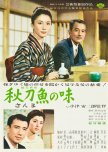Marry your daughter quickly, time may run out!
An Autumn Afternoon (1962) was Ozu's final film. It can be watched as a stand-alone or first Ozu film, but it will be more enjoyable to have seen many of Ozu's predecessor films.
Ozu made so many films with seasonal themes he had to subdivide films not only by season but by time of day. Had he lived longer, we may have had an Autumn evening, an Autumn morning, etc. (I'm being playful). Yet again, we have variations on a theme by Ozu. If you've seen Ozu films and are turned off by the covering of similar plots, characters, character names, please reconsider. Amidst the similarities, there is still more ground for us to cover. Even the topic of arranged marriage, despite being presented in at least ten Ozu films, has something new for us to consider each film. We might feel rather certain that we're completely against such an antiquated practice only to wonder if it might end up being okay, for some folks, or in general. Perhaps it wouldn't suit us, we think, but then we live in a world where many marriages by choice don't work out.
There is nothing particularly new or novel with this film's plot. The increasing westernization of Japan is apparent in this film. Global products like Canada Dry can be seen. Japanese customers appear to have difficulty focusing on their meals at restaurants while taking in the local baseball game by television. Golf clubs are no longer a niche item; they now have a mature used-sale market. Refrigerators are upgraded so often that neighbors warn fellow neighbors 'Don't be in such a rush to buy a fridge; a better one will soon be on its way'.
The characters are familiar for those having experienced other Ozu films. Yet, the characters are quite enjoyable here. Chishu Ryu plays what I consider to be one of his more complex characters. He's yet again a father, widowed, and trying to set his daughter up with a marriage, but the variation here as well as subtle differences in his character are fully distinct enough to generate both new reflection and enjoyment. It's as if we've had chocolate chip cookies, then Ozu splashes in a hint of mango with the new variation. They're still chocolate cookies, but we consider what we're eating with newfound perception. Chishu is still SO familiar to his other roles that we feel his character is rather an extension or an accumulation of all prior 'fatherly' roles, but again, there's something new here in the character and acting to digest. He certainly enjoyed drinking in this film!
Okada Mariko and Sada Keiji play their roles in their 2nd consecutive Ozu film (the prior one being End of Summer) rather well. The support characters in An Autumn Afternoon are not as well-developed or convincing compared to End of Summer, but there are a few standouts. Shima Iwashita plays a background role in Late Autumn, but her entry into a starring role in an ozu film gifts us with a srong performance. She carries on the Ozu 'Noriko' spirit quite well as the daughter who won't say what they want and tirelessly take care of their father and family. The character, the "Gourd", wasn't particularly convincing, but a way to comment on what the 'father' figure would turn out to be if they didn't successfully marry off their 'daughter'. In most Ozu films, we see that the 'father' is successful in marrying off their daughters. The "Gourd" also is a tool to comment on social economic differences, and especially the awkwardness when juniors/students end up far more successful than the seniors/masters (Sensei).
Ozu gives us another one of his great ellipses/gaps in An Autumn Afternoon. After showing us the face of a potential groom, he doesn't satiate our curiosity with an image of the actual groom. We only see the bride and her immediate family.
Gender roles in society and family are well-explored in this film. And it is a bit more forward in examining WWII themes or themes of the 'soldier'. While not Ozu's best film, it was certainly a solid last film in the oeuvre.
Ozu made so many films with seasonal themes he had to subdivide films not only by season but by time of day. Had he lived longer, we may have had an Autumn evening, an Autumn morning, etc. (I'm being playful). Yet again, we have variations on a theme by Ozu. If you've seen Ozu films and are turned off by the covering of similar plots, characters, character names, please reconsider. Amidst the similarities, there is still more ground for us to cover. Even the topic of arranged marriage, despite being presented in at least ten Ozu films, has something new for us to consider each film. We might feel rather certain that we're completely against such an antiquated practice only to wonder if it might end up being okay, for some folks, or in general. Perhaps it wouldn't suit us, we think, but then we live in a world where many marriages by choice don't work out.
There is nothing particularly new or novel with this film's plot. The increasing westernization of Japan is apparent in this film. Global products like Canada Dry can be seen. Japanese customers appear to have difficulty focusing on their meals at restaurants while taking in the local baseball game by television. Golf clubs are no longer a niche item; they now have a mature used-sale market. Refrigerators are upgraded so often that neighbors warn fellow neighbors 'Don't be in such a rush to buy a fridge; a better one will soon be on its way'.
The characters are familiar for those having experienced other Ozu films. Yet, the characters are quite enjoyable here. Chishu Ryu plays what I consider to be one of his more complex characters. He's yet again a father, widowed, and trying to set his daughter up with a marriage, but the variation here as well as subtle differences in his character are fully distinct enough to generate both new reflection and enjoyment. It's as if we've had chocolate chip cookies, then Ozu splashes in a hint of mango with the new variation. They're still chocolate cookies, but we consider what we're eating with newfound perception. Chishu is still SO familiar to his other roles that we feel his character is rather an extension or an accumulation of all prior 'fatherly' roles, but again, there's something new here in the character and acting to digest. He certainly enjoyed drinking in this film!
Okada Mariko and Sada Keiji play their roles in their 2nd consecutive Ozu film (the prior one being End of Summer) rather well. The support characters in An Autumn Afternoon are not as well-developed or convincing compared to End of Summer, but there are a few standouts. Shima Iwashita plays a background role in Late Autumn, but her entry into a starring role in an ozu film gifts us with a srong performance. She carries on the Ozu 'Noriko' spirit quite well as the daughter who won't say what they want and tirelessly take care of their father and family. The character, the "Gourd", wasn't particularly convincing, but a way to comment on what the 'father' figure would turn out to be if they didn't successfully marry off their 'daughter'. In most Ozu films, we see that the 'father' is successful in marrying off their daughters. The "Gourd" also is a tool to comment on social economic differences, and especially the awkwardness when juniors/students end up far more successful than the seniors/masters (Sensei).
Ozu gives us another one of his great ellipses/gaps in An Autumn Afternoon. After showing us the face of a potential groom, he doesn't satiate our curiosity with an image of the actual groom. We only see the bride and her immediate family.
Gender roles in society and family are well-explored in this film. And it is a bit more forward in examining WWII themes or themes of the 'soldier'. While not Ozu's best film, it was certainly a solid last film in the oeuvre.
Was this review helpful to you?







